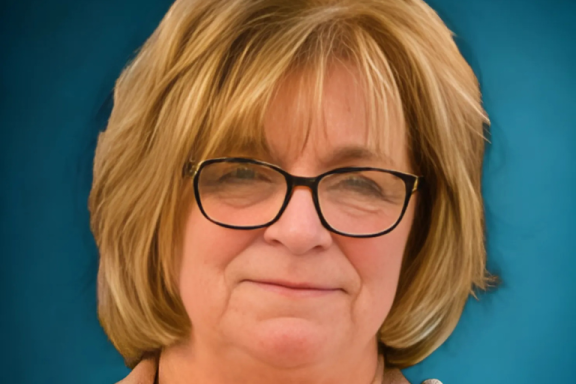When Sue DeBlois was on her summer break from college, she answered a help wanted ad in the newspaper: Seeking Staff for Group Home. At the time, Sue was studying to become a special education teacher, and she thought the job would provide valuable work experience. Before she knew it, the summer was over, and that job had turned into a career. Forty-one years later, Sue’s still working at Advocates, now serving as a program director for developmental services.
Building Deep Relationships
Sue remembers her early days at the organization, arriving at a huge, historic Victorian house in Attleboro. Eight former residents of Wrentham State Hospital had moved into the home, and Sue provided them with direct care before becoming an assistant manager, and later a manager.
Needless to say, things have changed a lot since those early days. “Back then, there were no cell phones, no computers, and everything was done on pen and paper,” recalls Sue.
Many things, however, have stayed the same. “I fell in love with all those people. I was hooked right then. Over the years, I’ve had the chance to work with such diverse, eclectic, and genuinely good-hearted people,” says Sue.
Over time, Sue built deep relationships with each resident, inviting them to her family’s holiday celebrations, school plays, and other special events.
As residents aged, Sue also took on the role of an unofficial hospice worker, providing support to residents, family members, and friends. “This is one of the hardest parts of the job, but I know that we played an important role. Most of our residents were able to pass away at home, and my colleagues and I could be present for their final moments,” she shares.
Fond Memories
Sue still speaks fondly about the original eight residents in Attleboro. “Those first eight people—I loved them,” she says. One special person was Martha*. “With Martha in our lives, my kids thought they had three grandmothers,” says Sue, laughing.
Sue also reminisces about the formal dances that began in the 1980s, where people dressed up, listened to music, and enjoyed dinner and dancing. To this day, these dances are still a highlight.
Interdependence and Independence
There were times when the community had reservations about having group homes in their neighborhoods. “It was fear of the unknown,” says Sue. But staff would invite neighbors into the homes and to events and celebrations at the houses. “We were able to build good relationships with our neighbors. We built a community,” she adds.
Parents and family members also had reservations when their loved ones moved into a group home. But staff worked closely with families and reassured them that living in the home would be a positive experience. “It’s amazing to me how these individuals bloom. They have more independence, they get to spend their own money, and they can do things that they’ve never done before, like cook in the kitchen,” Sue explains.
Today, Sue oversees six programs and manages clinical, medical, and staffing needs. Sue attributes much of her success to her dedicated colleagues and their shared mission. “Everyone is here for the right reasons. We have longevity amongst many of our staff. You don’t see that everywhere. We’re a supportive group that works as a team, and now we’re trying to teach and train the next generation,” she says.
To this day, Sue says one of her favorite parts of her job is visiting with residents in their homes. “What’s most important about this job is the people we support and treating them with kindness and respect. Compassion should always guide the way.”
*Name changed to protect privacy.
